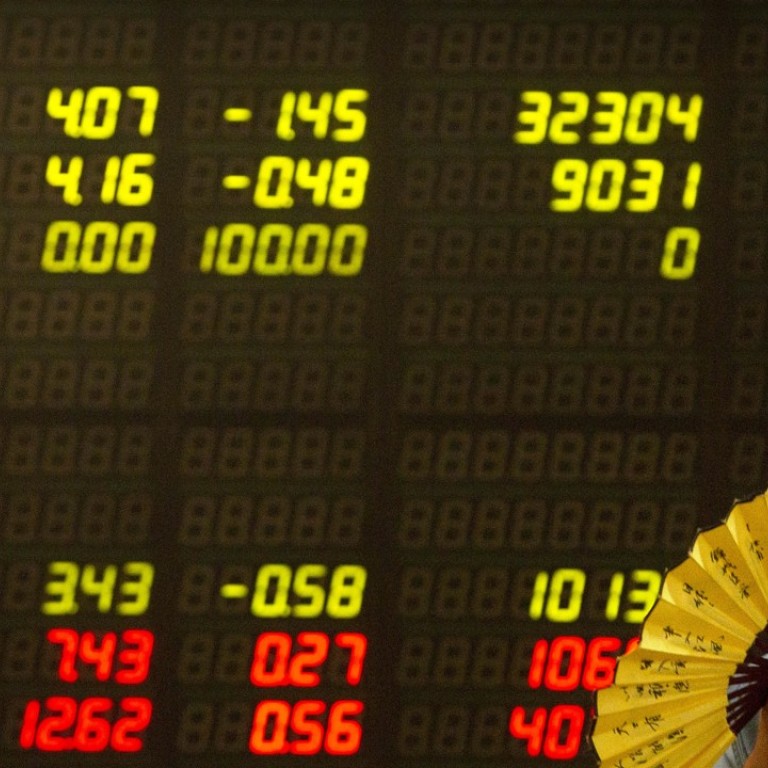
China stocks snap three-day rally as economy slows amid trade war, fallout from Meng Wanzhou arrest
- China’s November industrial output and retail sales growth both miss market expectations
- Hang Seng Index ends down 1.6 per cent; the Shanghai Composite Index drops 1.5 per cent
Hong Kong and mainland Chinese stocks fell sharply on Friday to close lower, breaking a three-day winning streak, as investors were rattled by data showing China’s economy weakened further amid the trade war and worsening diplomatic tensions between Beijing and Ottawa.
Hong Kong’s benchmark Hang Seng Index dropped 1.6 per cent, or 429.56 points, to close at 26,094.79.
For the week, it was marginally higher by 0.1 per cent, or 31 points.
The Hang Seng China Enterprises Index, known as the H-shares index, declined 1.9 per cent, or 197.42 points, to 10,359.43. It booked a weekly loss of 0.1 per cent.
Average daily turnover for the main board was HK$70.3 billion, down 5 per cent from last week.
On the mainland, the Shanghai Composite Index retreated 1.5 per cent, or 40.31 points, to 2,593.74. The index logged a 0.5 per cent loss for the week.
Earlier in the day, government statistics showed China’s industrial output expanded by 5.4 per cent in
November from a year earlier, missing market expectations. It was slower than October’s 5.9 per cent gain and marked the weakest monthly growth in almost three years.
Retail sales also grew less than expected, up 8.1 per cent in November, easing from an 8.6 per cent expansion in October. It was the slowest pace since 2003.
Still, fixed-asset investment increased 5.9 per cent for the first eleven months of the year, slightly higher than market forecasts.
“The latest data show an economy that is under pressure on both the external and domestic
front, with policy efforts to shore up growth still falling short,” wrote Julian Evans-Pritchard, senior China economist for Capital Economics.
“We think further weakness is on the horizon.
“Even if China and the US can negotiate a lasting truce on trade, cooling global growth and the lagged impact of slowing credit growth will remain a headwind on economic activity in the coming months.”
Market sentiment was weighed down by heightened diplomatic tensions between China and Canada, after Beijing confirmed on Thursday it had detained a second Canadian national this week.
Canadian businessman Michael Spavor is being questioned on suspicion of harming state security, according to an official news website of the northeastern province of Liaoning. His detention follows the arrest of Sabrina Meng Wanzhou, the chief financial officer of Chinese telecom giant Huawei in Vancouver on December 1.
“The market is cautiously watching and digesting the new developments of the Huawei incident,” said Kenny Tang Sing-hing, chief executive at China Hong Kong Capital Asset Management.
Also on the mainland, the large-cap CSI300 fell 1.7 per cent, or 53.78 points, to finish Friday at 3,165.91. The Shenzhen Component Index lost 2.3 per cent, or 178.39 points, to 7,629.65.
Combined turnover for the Shanghai and Shenzhen markets decreased 4 per cent to 292 billion yuan.
Technology stocks declined broadly on signs that Huawei was slashing orders from a Japanese supplier of industrial robots in the wake of the arrest.
In Hong Kong, AAC Technologies Holdings, which supplies acoustic components to Huawei, slid 4.9 per cent to HK$48.80. Sunny Optical Technology, a camera module supplier, fell 5 per cent to HK$70.80. On the mainland, telecommunications equipment company ZTE lost 2.7 per cent to 19.65 yuan.
Chinese property developers also weakened.
China Overseas Land fell 2.5 per cent to HK$27.20, and Country Garden closed down 2 per cent at HK$9.60.
Meanwhile, Shanghai-listed Poly Developments and Holdings erased 2.5 per cent to 13.00 yuan. Shenzhen-traded Vanke was off 2.4 per cent to 26.46 yuan.


